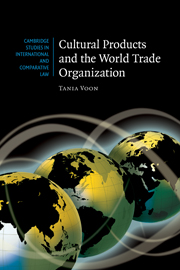Book contents
- Frontmatter
- Contents
- Detailed chapter outline
- Table of GATT/WTO agreements
- Table of GATT/WTO cases
- Table of abbreviations
- Foreword
- Acknowledgements
- Part I Stalemate and its ideological origins
- 1 Trade and culture
- 2 A case study of cultural products: protectionism vs cultural policy
- 3 What's wrong with the current treatment of cultural products?
- Part II Options for the future
- Bibliography
- Index
2 - A case study of cultural products: protectionism vs cultural policy
Published online by Cambridge University Press: 23 February 2010
- Frontmatter
- Contents
- Detailed chapter outline
- Table of GATT/WTO agreements
- Table of GATT/WTO cases
- Table of abbreviations
- Foreword
- Acknowledgements
- Part I Stalemate and its ideological origins
- 1 Trade and culture
- 2 A case study of cultural products: protectionism vs cultural policy
- 3 What's wrong with the current treatment of cultural products?
- Part II Options for the future
- Bibliography
- Index
Summary
Introduction
What are the underlying reasons for Members' dramatically different views on cultural products, as evidenced in the Uruguay Round and beyond? Put simply, an extreme ‘pro-culture’ position would be that cultural products are entirely different from other traded products and that, in order to preserve or promote local culture through them, governments should be free to regulate them and impose trade barriers against foreign cultural products in any way they choose. An extreme ‘pro-trade’ position would be that cultural products are identical to other traded products and that the notion of preserving or promoting local culture through them masks a purely protectionist impulse (that is, a desire to protect local industry from foreign competition). Moreover, discriminatory or traderestrictive measures simply do not work in promoting culture.
WTO Members typically adopt less extreme positions in trade negotiations. Thus, for example, Canada seeks to negotiate a new instrument on cultural diversity to ‘set out clear ground rules to enable Canada and other countries to maintain policies that promote their culture while respecting the rules of the international trading system and ensuring markets for cultural exports’. The USA accepts that cultural products have cultural elements distinct from other products, but it argues that the current WTO rules provide sufficient flexibility for Members to pursue their cultural objectives in connection with cultural products. Before we can begin to imagine ways of reaching a compromise that better serves the interests of all Members, it is crucial to appreciate the opposing arguments. The social, economic, and legal arguments concerning State support for cultural products provide a case study of the implications of culture more generally in the WTO.
- Type
- Chapter
- Information
- Cultural Products and the World Trade Organization , pp. 37 - 68Publisher: Cambridge University PressPrint publication year: 2007



